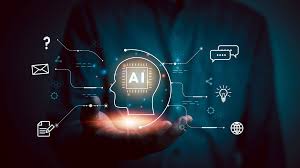The marketing landscape is evolving at an unprecedented pace, and Artificial Intelligence (AI) is at the forefront of this transformation. AI in marketing is no longer a futuristic concept—it’s a powerful tool that’s reshaping how businesses engage with their audiences. From personalized customer experiences to data-driven decision-making, AI is enabling marketers to create smarter, more effective campaigns. In this blog, we’ll explore the role of AI in marketing, its key applications, benefits, challenges, and the future trends that are set to redefine the industry.
What is AI in Marketing?
AI in marketing refers to the use of machine learning, natural language processing (NLP), and other AI technologies to analyze data, predict trends, and automate marketing processes. These tools enable businesses to deliver personalized experiences, optimize campaigns, and make data-driven decisions. AI in marketing is transforming how brands connect with their audiences, making campaigns more efficient, targeted, and impactful.
Key Applications of AI in Marketing
AI in Marketing: Personalized Customer Experiences
AI in marketing enables businesses to deliver highly personalized experiences to their customers. By analyzing customer data, such as browsing behavior and purchase history, AI can recommend products, tailor content, and create targeted campaigns that resonate with individual preferences.
Predictive Analytics
AI-powered predictive analytics helps marketers anticipate customer behavior and trends. By analyzing historical data, AI can forecast future outcomes, such as sales trends or customer churn, allowing businesses to make proactive decisions.
AI in Marketing: Chatbots and Virtual Assistants
AI-driven chatbots and virtual assistants are revolutionizing customer service in marketing. These tools can handle inquiries, provide product recommendations, and even process orders, offering 24/7 support and improving customer satisfaction.
Content Creation and Curation
AI tools can generate and curate content, such as blog posts, social media updates, and email campaigns. By analyzing audience preferences, AI ensures that the content is relevant and engaging, saving marketers time and effort.
Programmatic Advertising
AI in marketing powers programmatic advertising, which automates the buying and placement of ads. By analyzing user data in real-time, AI ensures that ads are shown to the right audience at the right time, maximizing ROI.
Benefits of AI in Marketing
AI in Marketing: Enhanced Personalization
AI enables marketers to deliver personalized experiences that resonate with customers, increasing engagement and loyalty.
Improved Efficiency
AI automates repetitive tasks, such as data analysis and campaign optimization, freeing up marketers to focus on strategy and creativity.
Data-Driven Decision Making
AI provides actionable insights by analyzing vast amounts of data, helping marketers make informed decisions and optimize campaigns.
AI in Marketing: Cost Savings
By automating processes and improving targeting, AI reduces wasted ad spend and increases the efficiency of marketing budgets.
Real-Time Insights
AI provides real-time data analysis, enabling marketers to adjust campaigns on the fly and respond to changing trends quickly.
Challenges of AI in Marketing
AI in Marketing: Data Privacy and Security
Handling customer data requires robust security measures to protect against breaches and ensure compliance with regulations like GDPR.
Ethical Concerns
AI algorithms can inadvertently perpetuate biases or make decisions that lack transparency. Marketers must ensure that AI is used ethically and responsibly.
Integration with Existing Systems
Integrating AI into legacy marketing systems can be complex and costly, requiring significant investment in time and resources.
Skill Gaps
The successful implementation of AI in marketing requires skilled professionals who understand both marketing and AI technologies. Bridging this skill gap is essential.
High Initial Costs
Implementing AI technologies can be expensive, particularly for small businesses. However, the long-term benefits often outweigh the initial investment.
Future Trends in AI in Marketing
Hyper-Personalization
AI will enable even more granular personalization, delivering tailored experiences based on real-time data and customer behavior.
Voice Search Optimization
As voice assistants like Alexa and Siri become more popular, AI will play a key role in optimizing content for voice search.
AI-Generated Visual Content
AI tools will increasingly generate visual content, such as images and videos, tailored to specific audiences and campaigns.
Enhanced Customer Journey Mapping
AI will provide deeper insights into the customer journey, helping marketers identify pain points and optimize touchpoints for better engagement.
Expansion of AI in Emerging Markets
AI in marketing will grow in emerging markets, enabling businesses to reach new audiences and drive growth in untapped regions.
AI in marketing is transforming the way businesses connect with their customers, offering smarter, more efficient, and highly personalized campaigns. While challenges like data privacy and integration remain, the benefits of AI far outweigh the risks.
As the marketing industry continues to evolve, businesses that embrace AI will stay ahead of the curve and unlock new opportunities for growth. By leveraging AI-powered insights, automation, and predictive analytics, companies can make data-driven decisions, streamline marketing efforts, and deliver exceptional customer experiences. Ultimately, adopting AI in marketing is no longer just an option but a necessity for businesses aiming to thrive in an increasingly competitive and dynamic digital landscape.
